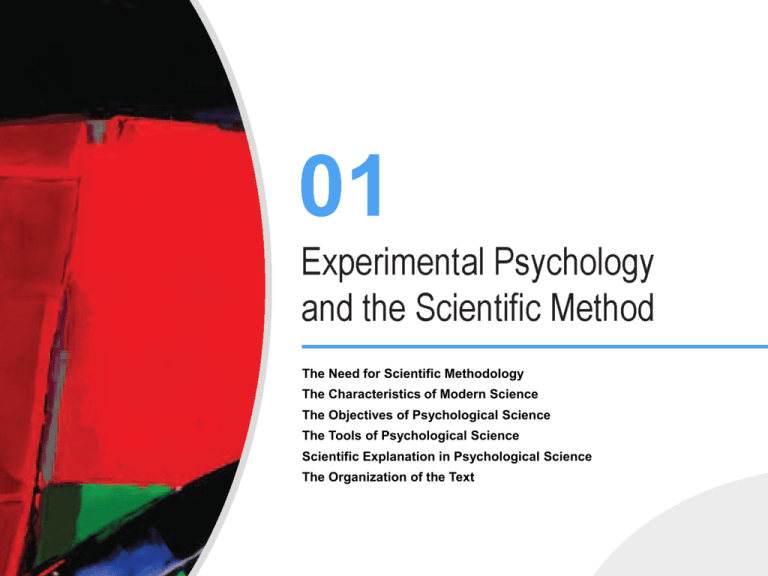Science - Wofford
advertisement

The Need for Scientific Methodology The Characteristics of Modern Science The Objectives of Psychological Science The Tools of Psychological Science Scientific Explanation in Psychological Science The Organization of the Text How are science, methodology, and data interrelated? Science connotes content and process. Methodology consists of the scientific techniques we use to collect and evaluate data. Data are the facts we gather using scientific methods. The Need for Scientific Methodology What is commonsense psychology? Heider called nonscientific data gathering commonsense psychology. This approach uses nonscientific sources of data and nonscientific inference. An everyday example is believing that “opposites attract.” The Need for Scientific Methodology Explain nonscientific inference. Nonscientific inference is the nonscientific use of information to explain or predict behavior. The gambler’s fallacy, overuse of trait explanations, stereotyping, and overconfidence bias illustrate this problem. The Need for Scientific Methodology What is the gambler’s fallacy? In the gambler’s fallacy, people misuse data to estimate the probability of an event, like when a slot machine will pay off. The Need for Scientific Methodology Why is the overuse of trait explanations a problem? When we overuse trait explanations to explain others' behavior, we often make unwarranted dispositional attributions and underuse situational information. This bias can reduce the accuracy of our explanations and predictions. The Need for Scientific Methodology How can stereotyping mislead us? In stereotyping, we falsely assume that specific behaviors cluster together. For example, since Imei is a Chinese-American student, she must study 10 hours a day and excel at math. In reality, she failed calculus. Stereotypes ignore individual differences. The Need for Scientific Methodology Why is overconfidence bias a problem? In overconfidence bias, we feel more confident about our conclusions than is warranted by available data. This form of nonscientific inference can result in erroneous conclusions when we don’t recognize the limitations of supporting data. The Need for Scientific Methodology Why is the scientific mentality important? Alfred North Whitehead’s scientific mentality assumes that behavior follows a natural order and can be predicted. This assumption is essential to science. There is no point to using the scientific method to gather and analyze data if there is no implicit order. The Characteristics of Modern Science What makes data empirical? Data are empirical when observed or experienced. Galileo’s empirical approach was superior to Aristotle’s commonsense method. Galileo correctly concluded that light objects fall as rapidly as heavy ones in a vacuum. The Characteristics of Modern Science What is a law? A law consists of statements generally expressed as equations with few variables that have overwhelming empirical support. Laws, like the Laws of Thermodynamics, are useful in the physical sciences. The Characteristics of Modern Science What is a theory? A theory is an interim explanation; a set of related statements used explain and predict phenomena. Theories integrate diverse data, explain behavior, and predict new instances of behavior. The Characteristics of Modern Science What is good thinking and why is it important? Good thinking is critical to the scientific method. We engage in good thinking when data collection and interpretation are systematic, objective, and rational. The Characteristics of Modern Science What is parsimony? The principle of parsimony is that we prefer the simplest useful explanation. For example, Crandall (1988) showed that a social contagion model of bulimia was more parsimonious than competing explanations. The Characteristics of Modern Science How did Sir Karl Popper believe that science advances? Sir Karl Popper proposed that science advances by revising theories based on the “weight of evidence.” Science is self-correcting as scientific explanations and theories are challenged, and revised or replaced. The Characteristics of Modern Science What role does the principle of modus tollens play in science? The principle of modus tollens allows us to disprove statements using a single, contrary observation. We can never prove a statement because a contradictory observation might be found later. The Characteristics of Modern Science How does replication advance science? Replication is an exact or systematic repetition of a study. Replication increases our confidence in experimental results by adding to the weight of supporting evidence. The Characteristics of Modern Science What are the four main objectives of science? The four main objectives of science are: description prediction explanation control The Objectives of Psychological Science What are the four main objectives of science? Description is a systematic and unbiased account of observed characteristics of behaviors. Prediction is the capability of knowing in advance when certain behaviors should occur. Explanation is knowledge of the conditions that reliably produce a behavior. The Objectives of Psychological Science What are the four main objectives of science? Control is the use of scientific knowledge to influence behavior. The Objectives of Psychological Science How does applied research differ from basic research? Applied research addresses real-world problems like how to improve student graduation rates. Basic research tests theories and explains psychological phenomena like helping behavior. The Objectives of Psychological Science What are the main tools of psychological science? The main tools of psychological science are: observation measurement experimentation The Tools of Psychological Science What are the main tools of psychological science? Observation is the systematic noting and recording of events. Systematic means that the procedures are consistently applied. The events or their signs must be observable. Observations must be objective so that there can be strong agreement among raters. The Tools of Psychological Science What are the main tools of psychological science? Measurement assigns numbers to objects, events, or their characteristics. This is an inherent feature of quantitative research. Baron and colleagues (1985) measured anger and depression using numerical scales. The Tools of Psychological Science What are the main tools of psychological science? Experimentation is the process we use to test the predictions we call hypotheses and establish cause-and-effect relationships. Experimentation is not always possible because our predictions must be testable. The Tools of Psychological Science What are the requirements for an experiment? We must be able to manipulate the independent variable and measure its effect on the dependent variable. Ethical concerns or technological limitations may prevent experimentation. The Tools of Psychological Science What are the requirements for an experiment? An experiment requires that we create at least two treatment conditions and randomly assign subjects to these conditions. In psychology experiments, we control extraneous variables so we that we can measure “what we intend to measure.” Scientific Explanation How does an experiment establish cause and effect? An experiment attempts to establish a causeand-effect relationship between the antecedent conditions (IV) and subject behavior (DV). Experiments establish a temporal relationship, because causes must precede effects. However, not all prior events are causes. Scientific Explanation What are pseudosciences? A pseudoscience is any field of study that gives the appearance of being scientific, but has no true scientific basis and has not been confirmed using the scientific method. Modern pseudosciences include past life regression, reparenting, and rebirthing. Scientific Explanation








